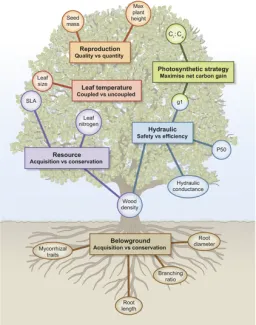There is growing interest in traits as a unifying tool in plant functional ecology. This prompted several NGEE Arctic researchers to organize the 39th New Phytologist Symposium on ‘Trait covariation: structural and functional relationships in plant ecology’, held in Exeter, UK on the 27–29 June 2017. More than 125 attendees met to: (1) assess the progress made in the study and use of plant trait variation and covariation to reveal tradeoffs, constraints, and strategy in plant function; (2) discuss the best way to use traits for modelling and predictive purposes; and, (3) identify the current frontiers in trait-based ecology. A major theme of the symposium was how trait covariance can identify common dimensions of phenotypic variation, whether they arise from biophysical or genetic constraints or selection for adaptive trait combinations. Three axes of plant strategy were focused on: resource acquisition vs conservation, quality vs quantity of propagules, and hydraulic efficiency vs safety (Figure). Two further axes of leaf strategy to maximize net carbon gain and regulate leaf temperature were also discussed. There were also multiple discussions on fine-root strategies, mycorrhizal strategies, and their interaction for belowground resource acquisition and defense. Discussion centered on covariation among traits and trait covariation with environment and how or whether these should be encoded within models. Allowing trait covariance to be predicted by a model, by competition or selection based rules, would enable the use of trait covariance as a model evaluation dataset. Although challenging, progress is being made in understanding the relationships between traits, plant strategy, and environment as well as the incorporation of more realistic trait variation in ecosystem models. Reference: Walker AP, L McCormack, J Messier, I Myers-Smith, and SD Wullschleger 2017. Trait covariation: The functional warp of plant diversity? New Phytologist 216: 976-980. http://dx.doi.org/10.1111/nph.14853
For more information, please contact:
Stan Wullschleger
wullschlegsd@ornl.gov

